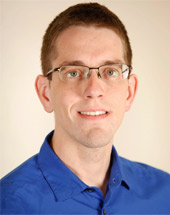Thomas Segall-Shapiro, PhD

Thomas Segall-Shapiro, a postdoctoral fellow in the Department of Biological Engineering at MIT, attended Rice University, where he earned a BS in biochemistry and cell biology and a BSB in bioengineering. Lured away from his initial focus on computer science by the promise of reprogramming living organisms, he became an active member of the Rice iGEM (International Genetically Engineered Machines) team starting almost as soon as he arrived in Houston. With iGEM, Thomas worked on exciting and wildly overambitious projects, including: bacteria that seek out and kill other bacteria, ‘smarter’ bacteriophages, and the production of high-value phytochemicals from low-tech fermentations (or, uh, BioBeer). In addition, he pursued more down-to-earth research on protein engineering, exploring how different proteins tolerate fragmentation into multiple pieces. Thomas also had the opportunity to intern at the J. Craig Venter Institute for two summers, where he worked on cellulose breakdown for biofuels and strategies for modifying bacterial genomes carried in yeast. His work on genome modification included a very small contribution to the creation of the first organism controlled by a synthetic genome, dubbed ‘synthetic life.’
With the support from his Hertz Fellowship, Thomas received his PhD in the Synthetic Biology Center at MIT, where he pursued the goal of reprogramming organisms for biological discovery and real world applications. His work in Chris Voigt’s lab focuses on building genetic control systems that regulate how engineered bacteria respond to their environment and implement complex functions. By engineering new activities into natural regulatory proteins he has developed a number of new tools that can control gene expression in previously unexplored ways. Currently he is working to develop genetic circuits that stabilize gene expression in order to achieve more predictable outcomes from engineered organisms.